As a small business owner, it’s essential to understand how to pay yourself properly while considering the financial health of your business. Paying yourself is not only a matter of personal income but also involves tax obligations and financial planning. In this comprehensive guide, we will explore the various methods of paying yourself as a business owner and provide valuable insights into bookkeeping and financial considerations.
Understanding Different Business Structures
The first step in determining how to pay yourself as a small business owner is to understand the structure of your business. The most common business structures include sole proprietorships, limited liability companies (LLCs), and corporations.
Sole Proprietorships
In a sole proprietorship, the business and the owner are considered the same entity. As a result, paying yourself is relatively straightforward. You can simply withdraw money from your business earnings for personal use. However, it’s crucial to separate personal and business expenses and maintain a separate bank account for your business to track income and expenses accurately.
Limited Liability Companies (LLCs)
LLCs offer more flexibility when it comes to paying yourself. The method of payment depends on the underlying tax structure of your LLC. If your LLC is taxed as a sole proprietorship or partnership, you can draw cash from the profits. In the case of an LLC taxed as a corporation, you can pay yourself a salary and potentially receive dividends from profits. It’s essential to consult with an accountant or tax professional to determine the most suitable method for your LLC.
Corporations
In a corporation, paying yourself as a business owner differs from other business structures. As an owner of a corporation, you have the option to pay yourself a salary or receive dividends. If you choose to receive a salary, you need to establish an employment agreement with the corporation and become an employee. Taxes will be withheld from your salary as with any regular employee. Alternatively, you can receive dividends based on your ownership percentage. It’s crucial to seek professional advice to ensure compliance with tax regulations and fulfill your obligations as a business owner.
Methods of Paying Yourself
Once you understand the structure of your business, you can explore the different methods of paying yourself as a small business owner. The two primary methods are owner’s draws and salaries.
Owner's Draw
An owner’s draw involves taking money directly from your business for personal use. This method allows flexibility in determining the amount and timing of your withdrawals. However, taxes are not automatically withheld, so it’s important to set aside a portion of your draw for tax purposes. Keeping a separate bank account for your business and personal finances can help ensure accurate bookkeeping and budgeting.
Salary
Paying yourself a salary is similar to receiving a regular paycheck as an employee. This method involves running payroll and withholding taxes from your salary. It is particularly applicable to business structures such as corporations, where you are considered an employee of the company. By paying yourself a salary, you can ensure consistent income and streamline tax obligations. However, it’s important to determine a reasonable salary that aligns with your business’s financial health and market standards.
Also Read: Understanding Payroll Taxes
Determining Your Compensation
Once you’ve chosen a payment method, the next step is to determine how much to pay yourself as a small business owner. Several factors should inform this decision.
Financial Needs
Consider your personal financial obligations, such as living expenses, debt repayments, and insurance. Your compensation should be sufficient to cover these expenses while allowing for personal financial stability.
Business Expenses
It’s crucial to maintain a clear understanding of your business’s financial requirements. Consider regular expenses, such as rent, utilities, and operational costs. Set aside funds for unexpected expenses and emergencies to ensure the financial stability of your business.
Profitability and Growth
Evaluate the profitability and growth potential of your business. Determine the amount of profit needed to reinvest in the business for expansion, marketing, or hiring. Striking a balance between personal compensation and business growth is essential for long-term success.
Bookkeeping and Financial Considerations
Accurate bookkeeping is crucial for managing your business’s finances and paying yourself as a business owner. Consider implementing the following practices to ensure proper financial management:
Separate Business and Personal Finances
Maintain separate bank accounts for your business and personal finances. This separation simplifies bookkeeping, helps track income and expenses accurately, and ensures compliance with tax regulations.
Track Income and Expenses
Implement a robust bookkeeping system to track income and expenses. Use accounting software or consult with an accountant to maintain accurate records of your business’s financial transactions.
Budgeting and Cash Flow Management
Develop a budget that accounts for both business and personal expenses. Regularly review and update your budget to ensure financial stability and identify areas for improvement.
Tax Planning and Compliance
Stay informed about tax obligations and regulations applicable to your business structure. Consult with a tax professional to ensure compliance and optimize tax efficiency.
Explore: Online Bookkeeping Price Packages
Additional Considerations and Best Practices
In addition to the fundamental aspects of paying yourself as a small business owner, there are some additional considerations and best practices to keep in mind:
Seek Professional Advice
Consult with an accountant, tax professional, or bookkeeper to receive personalized guidance tailored to your specific business circumstances. They can provide valuable insights into tax planning, legal compliance, and financial management.
Regularly Review and Adjust
Regularly review your compensation strategy and financial plan. Adjust your salary or draws as needed to align with changes in your business’s financial performance and personal financial needs.
Maintain Documentation
Keep thorough documentation of your compensation decisions, financial transactions, and tax filings. This documentation will be valuable for audits, financial analysis, and legal compliance.
Stay Informed
Stay updated on changes in tax regulations, accounting standards, and industry practices. Attend educational seminars or workshops to enhance your financial knowledge and skills.
Paying yourself as a small business owner requires careful consideration of your business structure, financial needs, and bookkeeping practices. By understanding the methods of payment, determining fair compensation, and implementing sound financial management strategies, you can ensure both personal financial well-being and the success of your business. Seek professional advice when necessary and stay proactive in managing your business’s finances. With proper planning and attention to detail, you can navigate the complex landscape of paying yourself as a business owner and achieve your financial goals.
Unlock the power of informed decisions. Let’s talk success today!





